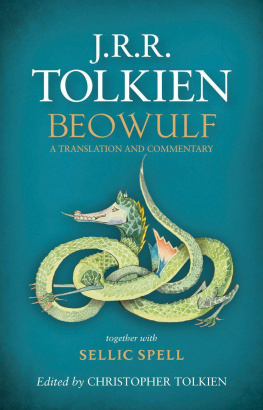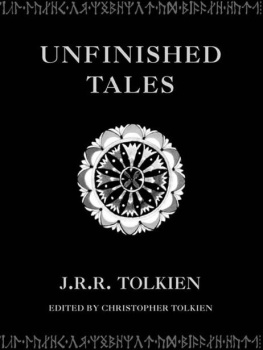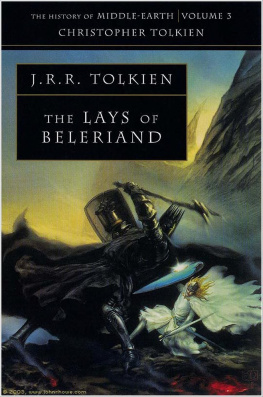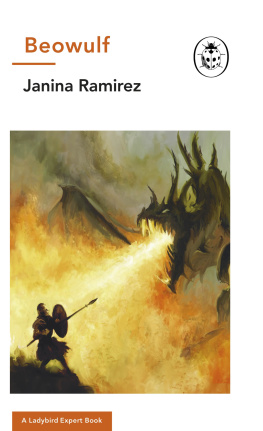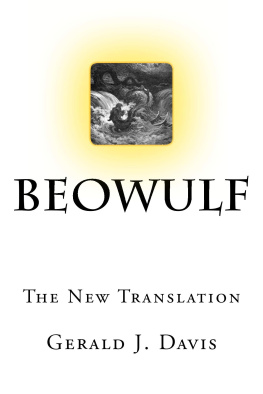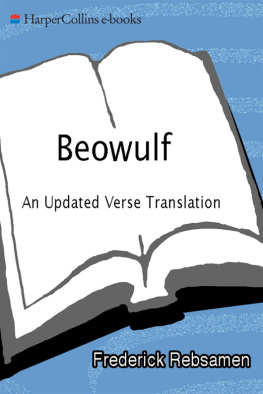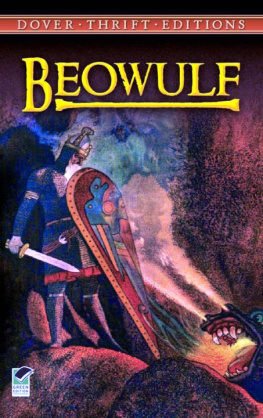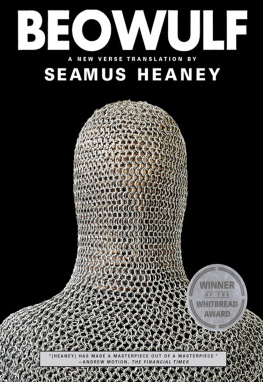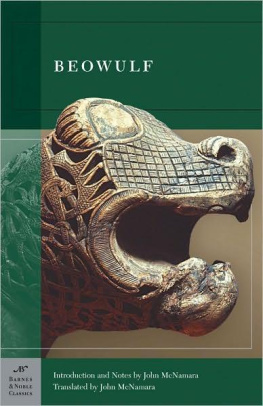
CONTENTS
The page numbers in this text relate to the printed version of the book; they do not match the pages of your ebook. Where no hyperlink is present you can use your ebook readers search tool to find a specific word or passage.
Since the nature and purpose of this book could very easily be misunderstood I offer here an explanation, which I hope will also be a justification.
It is well-known that there exists a translation of Beowulf into modern English prose made by J.R.R. Tolkien; and in view of his reputation and eminence in Old English literary and linguistic scholarship the fact that it has remained unpublished for so many years has even become a matter of reproach.
I am responsible for this; and the primary reason, or explanation, is fairly simple. The translation was completed by 1926, when my father was 34; before him lay two decades as the professor of Anglo-Saxon at Oxford, two decades of further study of Old English poetry, together with an arduous programme of lectures and classes, and reflection most especially on Beowulf . From his lectures of those years there survives a great deal of writing on the poem, including much on the interpretation of the detail of the text. Clearly, there was no step-by-step relationship between the lectures and the translation, but changes made to the translation (and there are many) at different times can often be seen to accord with discussion of the questions in his lectures. In other cases he did not alter the translation in the light of his later, revised opinion.
There seemed no obvious way in which to present a text that was in one sense complete, but at the same time evidently unfinished. Merely to print what appears to have been his latest choice in the translation of a word, a phrase, or a passage and to leave it at that seemed misleading and mistaken. To alter the translation in order to accommodate a later opinion was out of the question. It would of course have been possible to attach my own explanatory notes, but it seemed very much better to include in this book actual passages from the lectures in which he expounded his views on the textual problems in question.
He did indeed explicitly intend that the series of lectures on Beowulf which I have used in this book should be a textual commentary, closely concerned with verbal detail. In practice however he found this restriction confining: he was very often led from the discussion of a word or phrase to more far-reaching exposition of the characteristics of the Old English poet, his thought and his style and his purpose; and in the course of the lectures there are many short but illuminating essays, arising from specific points in the text. As he wrote, I try to do it, yet it is not really possible or satisfactory, to separate ones commentary into legendary content and text.
There is here, amid the huge library of Beowulf criticism, a very evident individuality of conception and insight; and in these characteristically expressed observations and arguments there can be seen the closeness of his attention to the text, his knowledge of the ancient diction and idiom, and his visualization of scenes thus derived. There emerges, as it seems to me, his vivid personal evocation of a long-vanished world as it was perceived by the author of Beowulf ; the philological detail exists to clarify the meaning and intention of that poet.
Thus after much reflection I have thought to enlarge and very greatly extend the scope of this book by extracting a good deal of material from the written form of those lectures, providing (as I hope) a readily comprehensible commentary arising in express relationship with the actual text of the poem, and yet often extending beyond those immediate limits into expositions of such matters as the conception of the wrecca , or the relation of the characters in the poem to the power of fate.
But such a use of these abundant writings, in a way that was of course by no means intended, necessarily raises problems of presentation that are not easy to resolve. In the first place, this is a work of my fathers (distinct in this from all save one of the editions of his unpublished writings that I have made) which is not of his own conceiving, but is concerned with a specific work, of great celebrity and with a massive history of criticism extending over two centuries. And in the second place, the lectures in question were addressed to an audience of students whose work on Old English was in part based on the demanding language of Beowulf , and his purpose was to elucidate and illuminate, often in precise detail, that part of the original text that was prescribed for study. But his translation would of course have been addressed primarily, though not exclusively, to readers with little or no knowledge of the original language.
In this book thus conceived I have tried to serve the different interests of possible readers; and in this connection there is a curious and interesting partial parallel with my fathers dilemma that he expressed in a letter to Rayner Unwin of November 1965, concerning his inability to compose the editorial matter to accompany his completed translation of Sir Gawain and the Green Knight :
I am finding the selection of notes, and compressing them, and the introduction, difficult. Too much to say, and not sure of my target. The main target is, of course, the general reader of literary bent but with no knowledge of Middle English; but it cannot be doubted that the book will be read by students, and by academic folk of English Departments. Some of the latter have their pistols loose in their holsters. I have, of course, had to do an enormous amount of editorial work, unshown, in order to arrive at a version; and I have, as I think, made important discoveries with regard to certain words, and some passages (as importance in the little world of Middle English goes).... I think it desirable to indicate to those who possess the original where and how my readings differ from the received.
Years later, in 1974, soon after my fathers death, I referred to this letter of his when writing to Rayner Unwin on the subject of a posthumous publication of his translation of Sir Gawain . I said that I had searched through his notes on Gawain , but I can find no trace of any that would be remotely suitable for the general reader of literary bent but with no knowledge of Middle English or for most students, for that matter; and I wondered whether it was not his complete inability to resolve this question that prevented him from ever finishing the book. I said that the solution that I (doubtfully) favoured was to have no learned commentary at all; and continued:
But quite apart from this, and assuming that the philological gunmen whom my father was anxious about can be safely neglected, what of the general reader of literary bent but no knowledge of Middle English? The situation is so highly individual that I find it difficult to analyse. In general I would assume that a book of translations of mediaeval poems of this order published without any commentary on the text at all would be so odd as to arouse hostility.
My solution in the present case is of course based on different materials standing in different relationships, in origin going back some three quarters of a century and more, but it is certainly open to criticism: the commentary as here presented is and can only be a personal selection from a much larger body of writing, in places disordered and very difficult, and strongly concentrated on the earlier part of the poem. But it goes no further than that; and it has therefore no more than a very superficial resemblance to an edition. It does not aim at any degree of general inclusiveness, any more than my fathers lectures did: as he himself said, he was largely restricting himself to matter where he had something personal to say or to add. I have not added explanations or information that a reader might look for in an edition; such very minor additions as I have made are mostly those that seem needed by elements in the commentary itself. And I have not myself related his views and observations to the work of other scholars before him or after him. In making this selection I have been guided by relevance to features of the translation, by my own estimate of the general interest of the subject-matter, and by the need to keep within limits of length. I have included a number of notes from the lectures on very minor points in the text that illustrate how from a small grammatical or etymological detail he would derive larger conclusions; and a few elaborate discussions of textual emendations to show how he presented his arguments and evidences. A fuller account of these lectures as they survive in written form, and of my treatment of them, will be found in the introduction to the commentary, .
Next page
